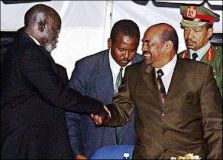UN diplomats skeptical of Nigeria’s proposal for Sudan tribunal
UNITED NATIONS, Mar 17, 2005 (AP) — Members of the U.N. Security Council expressed skepticism Thursday about a Nigerian proposal for an African-run tribunal to prosecute human rights violators and war crimes suspects from Sudan ‘s conflict-wracked Darfur region.

|
|
Sudanese President Omar El Bashir (R) shakes hands with the leader of Sudan’s People Liberation Movement/Army John Garang after the signing of accords on two outstanding issues paving the way for the signing of a comprehensive peace deal. (AFP). |
The diplomats said the council needed to focus on breaking its own deadlock over a proposed resolution for a 10,000-strong peacekeeping force to help monitor a peace agreement ending a 21-year civil war between the government and rebels in southern Sudan .
While the U.S.-sponsored resolution is meant to help Sudan recover from the civil war, it is also aimed at fostering peace in Darfur, a western region of the country where the U.N. now estimates that about 180,000 people have died from violence, disease or malnutrition since October 2003 – 2 1/2 times the previous estimate.
But a key sticking point has been how to bring war crimes suspects to justice.
Diplomats say a dozen of the 15 council members back a U.N. panel’s call to refer suspects to the International Criminal Court. The U.S., however, vehemently opposes the world’s first permanent war crimes tribunal and wants suspects to be tried by a new tribunal in Arusha, Tanzania.
Nigeria made its proposal on behalf of the African Union, which it currently heads, but some members questioned the idea’s viability.
“There must be lots of skepticism whether or not this is a practical and realistic alternative,” Britain’s U.N. Ambassador Emyr Jones Parry said. “Especially is it an alternative which can command the respect of all the parties in Sudan , and that I doubt very much indeed.”
Britain and eight other members of the council support the International Criminal Court and want the Sudan cases referred to it. Earlier this year, a U.N.-appointed panel recommended that action as well.
Also Thursday, the council extended the U.N. political mission in Sudan for another week as negotiations continued on the resolution. The council had done the same thing last week.
France, another supporter of the ICC, demanded the resolution be passed soon and also expressed doubt about the Nigerian proposal.
“We have to look at it very carefully but we don’t think that it can substitute or replace the conclusion of the inquiry commission to refer (the cases) to the ICC,” France’s U.N. Ambassador Jean-Marc de la Sabliere said.
De la Sabliere urged the council to focus on its resolution, saying time was running out for Darfur.
“The situation is bad so the resolution is needed and we have to adopt it as soon as possible,” he said.
On Wednesday night, Richard Grenell, spokesman for the U.S. Mission, had said “in general we support the premise that they are pursuing of African solutions to African problems, but we’re still awaiting the specifics on this proposal.”
